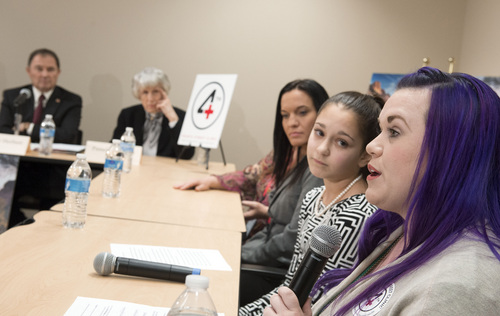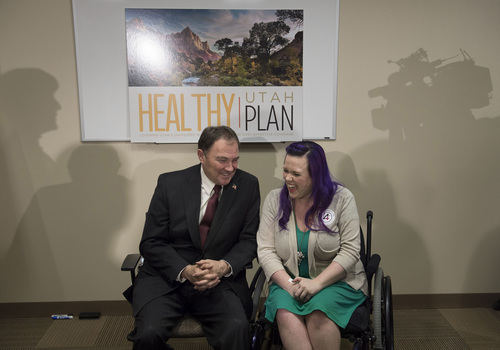This is an archived article that was published on sltrib.com in 2014, and information in the article may be outdated. It is provided only for personal research purposes and may not be reprinted.
Two thirds — 66 percent — of the Utahns who would benefit from an expansion of Medicaid are working or worked within the past year, according to an analysis of U.S. Census data.
Those 90,000 individuals are employed in a range of industries, from food service and construction to transportation and child care. They are telephone operators, cashiers, home health aides and janitors — "the backbone of the economy," said Rachel Klein, strategy and enrollment director at Families USA, which collaborated on the report with the Utah Health Policy Project (UHPP).
The report challenges an enduring stereotype of the poor and uninsured as being unwilling to work or unemployable.
These Utahns are holding down low-wage jobs, often seasonal or part-time, that either don't offer health benefits or have a workplace health plan that is unaffordable, said RyLee Curtis, UHPP's Medicaid policy analyst.
Of the 34 percent of Utahns in the "coverage gap" who are not working, 18 percent are classified as not in the workforce, including students, nonworking spouses and people with disabilities, shows the analysis of 2010-2012 census data.
The report also reinforces previously published data showing Medicaid to be a moneymaker for Utah.
If Utah had expanded Medicaid on Jan. 1 — or adopted a private insurance alternative being pitched by Utah Gov. Gary Herbert — federal funds flowing to the state could have supported 2,264 new jobs and added $138 million to the gross state product, said Curtis.
Instead, "Utah workers living without health insurance are one illness or one injury away from losing their job, their income and their security," Curtis said. "Every working day begins with a question of how you feel. ... An insured workforce is a healthy workforce, and therefore, a more reliable and productive workforce."
Utah is among 24 states that have yet to expand Medicaid as called for by the Affordable Care Act. The law would turn the health safety net into a purely needs-based program, available to anyone with incomes up to 138 percent of the federal poverty level, or $27,310 for a family of three.
Currently in Utah to be covered by Medicaid, you have to be both poor and fit a qualifying category, such as being pregnant or disabled. And the income thresholds vary. Only the poorest parents — with incomes at 47 percent of poverty, or $9,301 for a family of three — qualify.
Adults without children aren't eligible, no matter how poor.
Opponents of expanding Medicaid, including Utah House Speaker Becky Lockhart, R-Provo, are philosophically opposed to increased federal spending on entitlements. Most of the expansion is paid for by the feds, but Utah's share is significant and could edge out other spending priorities, they say, arguing instead for enhancing state programs, such as the Primary Care Network, which covers preventive care and some prescriptions, but has limited spots.
Doing so, however, would cost Utah taxpayers more than a full Medicaid expansion and would deliver less comprehensive coverage, counter low-income advocacy groups such as UHPP.
Herbert has been quietly gathering legislative support for his plan to use public Medicaid dollars to buy private coverage for the expansion population.
Meanwhile, people such as Damian Trujilo wait.
A full-time student at Salt Lake Community College, Trujilo works 30 hours a week for $10 an hour as a case manager for an addiction center.
He has been uninsured his entire adult life and said health insurance would "alleviate a lot of stress," and allow him to get medication for his asthma and depression.
With health coverage, Stacy Davis-Stanford could get a firm diagnosis and treatment for a neurological disorder that was triggered after a major car accident in 2010.
"My doctor thinks it's a form of serious, progressive multiple sclerosis," said the 28-year-old.
Before the accident, she had a lucrative job with health benefits, which she couldn't keep due to flare-ups of strokelike symptoms, such as paralysis and loss of speech.
On good days the Salt Lake Community College graduate is able to attend to her jewelry business and work at an unpaid internship at a service center for people with disabilities. She has accumulated more than $250,000 in medical bills for trips to the emergency room.
"When I lost my job, I almost immediately looked for what I could do to take care of myself and started this business. ... I'm doing the right thing and figured that by doing the right thing, the system would be there to help when I needed it," she said.
"People tend to brush me off and say, 'you're one person who falls through the cracks,' " she said. "Maybe if they tell themselves that, they can sleep at night. But there are tens of thousands of us out there."
Twittter: @KStewart4Trib —
Where Utahns who would benefit from an expansion work
Projections differ on how many Utahns would benefit by expanding Medicaid, from 111,000 to the 140,000 figure cited in a new report by Families USA and the Utah Health Policy Project.
Of those, the report says, 92,000 are employed as follows:
• 12,898 food service
• 12,543 retail sales
• 11,338 office and administrative support, including hotel clerks and messengers
• 9,660 construction
• 8,631 cleaning and maintenance
• 7,177 production, including butchers, laundry workers and tailors
• 6,295 transportation, including bus and taxi drivers and parking attendants
• 4,848 personal care, including barbers, child care workers and personal care aides
• 3,763 management
• 14,773 miscellaneous other jobs —
Herbert's 'Healthy Utah' proposal
Utah Gov. Gary Herbert wants to use public Medicaid dollars to buy private coverage for an estimated 111,000 Utahns with incomes up to 138 percent of federal poverty, or $15,856 for an individual or $31,322 for a family of four.
Participants in his "Healthy Utah" plan would have to contribute an average of $420 a year toward their health care.
Some would face a work requirement. Low-income parents whose children are on Medicaid could get financial help to move the whole family onto a private health plan.
"On private insurance, they can probably get better quality of care and will have more insurance choices to fit their unique [health] needs," Herbert said. "Nobody's getting a free ride; they've got to put skin in the game. It'll make for a better program with better outcomes and give us better bang for the buck."





